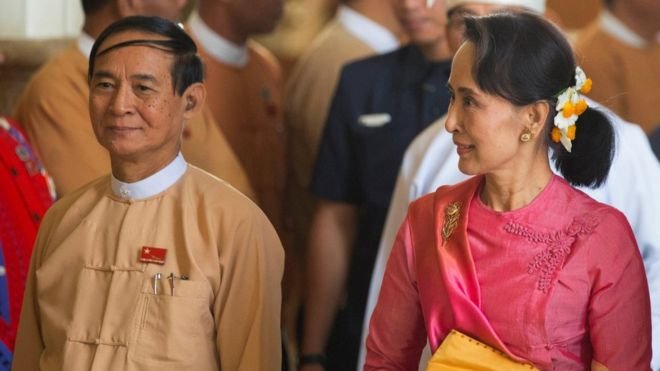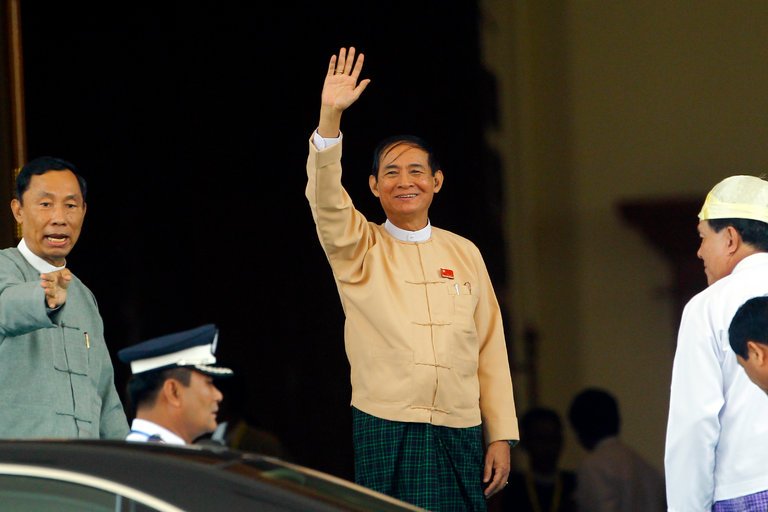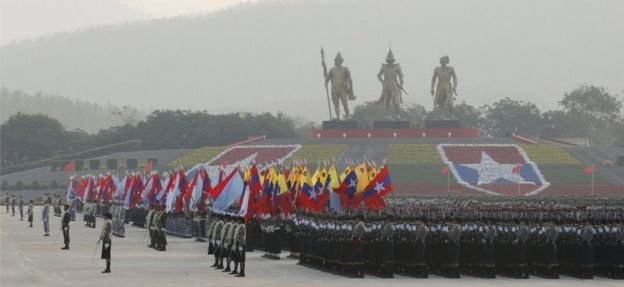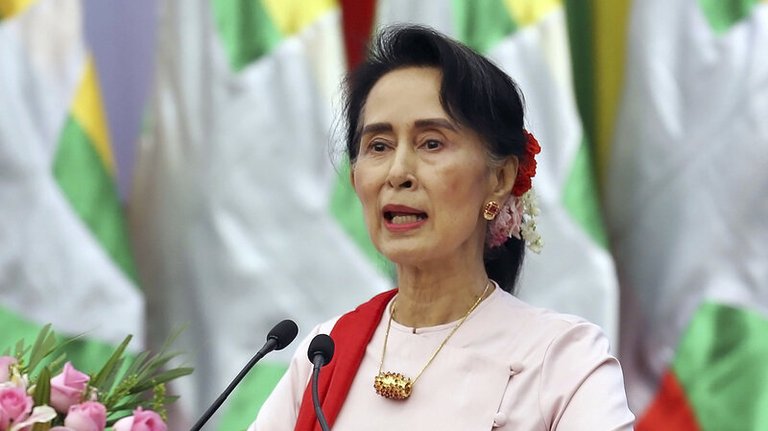
Myanmar's parliament has elected U Win Myint as the country's next president in 28th March 2018, a week after the resignation of his predecessor.
How he become a president
U Win Myint, a close aide of Aung San Suu Kyi, has been a speaker in the lower house since 2012 and was widely tipped for the top job. But his role will be essentially ceremonial, like former president U Htin Kyaw, with Ms Suu Kyi acting as de facto president. U Htin Kyaw resigned as president last week, amid growing health concerns.
Parliament then had seven days to choose a successor, and voted from a short-list of the three vice-presidents on Wednesday.
Earlier last week, Win Myint, 66, had been made a vice-president, a further sign he was likely to assume the presidency. As a long-time member of Ms Suu Kyi's National League for Democracy, he is seen as a Suu Kyi loyalist. The other two vice-presidents were Myint Swe, who served as acting president after Htin Kyaw stepped down, and Henry Van Thio.
Who is Win Myint
U Win Myint ('U' is an Burmese equivalent of 'Mr.' ) is a former political prisoner for his participation in Myanmar's democracy movement in 1988 Uprising. He also served as MP for House of Representatives from 2012 to 2018. The 66 years old is one of the so-called “four Wins” – along with U Win Htein, U Nyan Win, and the late U Win Tin – whom the party leader trusted most.

He was born in Nyaung Chaung Village, Danubyu, Ayeyarwady Region, Burma to parents U Tun Kyin and Daw Than. He graduated with a Bachelor of Science degree in geology from the Rangoon Arts and Science University. He married to Daw Cho Cho and the couple has one daughter, Phyu Phyu Thin, a senior advisor of City Mart Holdings.
After graduating in geology from Rangoon Arts and Science University, Win Myint became a High Court senior lawyer in 1981 and become a lawyer of the Supreme Court of Myanmar. In 1985, he became a High Court advocate. He was jailed for his role in the 8888 Uprising, and has been described by some who have met him as rather a closed book.
Out of jail in time for the Myanmar general election, 1990, which the military later nullified, he run successfully for Ayeyarwady Region’s Danubyu Township, winning a majority of 20,388 (56% of the votes), but was never allowed to assume his seat.
He resumed his political career in the Myanmar by-elections, 2012, winning a Pyithu Hluttaw, lower house seat in Pathein constituency. In the Myanmar general election, 2015, he was elected as Pyithu Hluttaw MP for Tamwe Township, in Yangon. He served as the Speaker of the House of Representatives of Myanmar from 2016 to 2018.
Win Myint resigned as Speaker of the Pyithu Hluttaw, on March 21 2018, following the resignation of U Htin Kyaw as President of Myanmar. A move was seen by many as a preparation by the National League for Democracy for him to be put forward as a candidate for the presidency. His position was succeeded by his deputy T Khun Myat.

On 23 March 2018, the Pyithu Hluttaw confirmed the election of Win Myint as the House of Representatives' nominee for vice president, paving the way for Win Myint to enter the election process for the next President of Myanmar. He defeated opposition Union Solidarity and Development Party's candidate Thaung Aye. On 28 March 2018, the Pyidaungsu Hluttaw elected Win Myint as the 10th President of Myanmar. Ms. Aung San Suu Kyi, 72, made a rare appearance in Parliament to observe the vote, joined by Mr. Win Myint.
Military still in control?

Most Burmese don't know what plans Win Myint may have for the economy, bringing peace in the troubled border regions or how to deal with the Rohingya crisis. The key criteria for this job was loyalty to Aung San Suu Kyi. She will continue to pull the strings.

Ms Suu Kyi, a Nobel Peace Prize Winner, who was jailed for years under the military junta, is banned from taking the presidency herself. A clause in the Myanmar constitution - widely seen as being deliberately designed to keep her from office - states that no-one with children of another nationality can be president. She had two children with her late British husband. After her party’s landslide victory in 2015, she sought to get around the ban by naming herself State Counselor, a post not included in the Constitution, and declaring herself to be “above the president.” She is still widely regarded as a heroine in the country, with supporters saying her hands are tied by the military regarding global criticism for not speaking up about the plight of the Muslim Rohingya minority in Rakhine state.
When it comes to real power here, it is still the military in control. Myanmar's military legacy still continues amid a slow transition to democracy, with the generals still in charge of security and guaranteed a quarter of parliamentary seats. The Constitution creates a divided government in which the army commander in chief appoints a quarter of Parliament’s members and three powerful cabinet members and reports to no civilian authority. Tuesday's celebration of Armed Forces Day showed us that. Planes, helicopters and 16,000 soldiers marching across a vast parade ground for the cameras outside the capital, Nay Pyi Taw. See below for the clip from Daily Mail YouTube Channel :
The commander-in-chief, Senior General Min Aung Hlaing, told his troops in Armed Forces Day speech that the army must play a key role in the life of the nation.
Hope for the future
But there is hope Mr Win Myint will help lead the country out of the control of the generals, who are steadily ageing and not being replaced when they die. The new president fought alongside Ms Suu Kyi during the 1988 democracy movement which was violently quashed by the military junta. He was taken political prisoner with Ms Suu Kyi for the up-rising and was jailed several times since during the country's military rule. He reportedly missed being by his son's deathbed after military intelligence said he could only see his son if he gave up politics.
Mr. Win Myint has more political experience than his predecessor and is considered more of an activist. As a speaker of the house, he has been known to reprimand military-linked MPs in parliament, especially those who have not prepared enough for debates. His win has been welcomed by fellow MPs who are looking to him to follow through on protecting farmers' rights, a crucial topic in the country.
Source :
ㅤ
ㅤ
ㅤ
hi